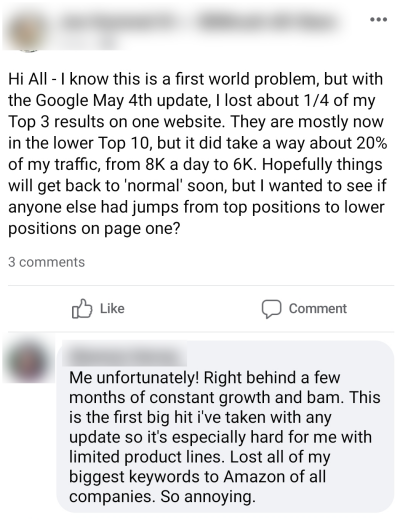Is My Site Affected by a Search Engine Algorithm Update?
Google search engine algorithm updates happen regularly in small and large batches, with the latter usually called ...
Google search engine algorithm updates happen regularly in small and large batches, with the latter usually called “broad” or “core” update and given a name.
The latest search engine algorithm update as of this writing was the “May 2020 Core Update” which was announced on 4 May 2020 by Google’s Danny Sullivan. The roll out took two weeks and completed on 19 May 2020.
Later today, we are releasing a broad core algorithm update, as we do several times per year. It is called the May 2020 Core Update. Our guidance about such updates remains as we’ve covered before. Please see this blog post for more about that:https://t.co/e5ZQUAlt0G
— Google SearchLiaison (@searchliaison) May 4, 2020
The May 2020 Core Update was a big update that caused unprecedented shifts in rankings of websites across industries on Google Search results pages (SERPs) – meaning, many websites suffered substantial drops or gains in web traffic, as validated by both the companies that make tools for SEO and search experts.
Here’s a sample thought of someone whose business is impacted by the May 2020 core update:

Now that the core update is completed, it is the best time to step back and check if your website has been hit.
Search Engine Algorithm Update Checklist
Here is a checklist to help you with your diagnosis:
- Use Google Analytics to check the trends of your website’s Organic Search traffic. See if your website’s traffic from Google drastically increased/decreased by more than 20% in the past 2 weeks compared to the previous period.
- Use Google Search Console to check if your web pages still show up as much on Google searches. Have a look at the Organic Performance module and check if your website’s Total Impressions noticeably increased/decreased by more than 20% in the past 2 weeks compared to the previous period.
- If you experienced a decrease in Organic Search traffic, dive deep on Analytics and identify which pages on your site suffered the blow.
- Once you have identified the affected pages, evaluate them by the following:
- Content quality. Does the content follow the Expert-Authoritative-Trustworthy (E-A-T) framework? Is your content helpful to users?
- Page experience and loading speed. Does the web page load in less than 3 seconds on mobile? Does my page follow visual hierarchy? Are call-to-actions clear?
- On-page technical errors. Is the web page free of errors that make it difficult for search engines to crawl and index it?
How do I keep my ranking after a search update?
Google says that “there is nothing wrong with pages that may perform less well in a core update.”
However, if your web pages are affected, it is best to re-assess your content. You have to ensure that you do not violate their webmaster guidelines.
If you need help in optimising your affected pages, contact us to take your free SEO Site Health Audit and uncover technical SEO issues.
We also recommend that you track your website’s ranking on keywords that are important to your business.
